- Home
- Nick Carter
The Istanbul Decision Page 2
The Istanbul Decision Read online
Page 2
The Litchfield Municipal Airport in Phoenix is rather small, in spite of the city's size, with concourses for deplaning passengers at one end and a large lobby with a double baggage carousel in the center. At the far end, doors lead to the parking lot. Carter arrived at 9:58 P.M. exactly and went directly to the baggage carousel.
He was relatively sure the usual broken-down station wagon with Mesa Verde Dude Ranch printed on the door in flaking gold letters would be waiting for him outside to take him the rest of the way to Tempe, and he was equally confident the driver would have been more than willing to tend to his bags as well, but Carter much preferred to look after his own luggage.
Over his shoulder he carried a small leather bag that contained his toiletries and other personal effects, as well as whatever book he was currently reading, usually a foreign language grammar or contemporary political history. But it was his other case, a finely tooled handmade Brazilian two-suiter, that he missed most whenever he flew, and for which he watched now with a steady gaze as the carousel began to turn and luggage began dropping to the rail. This bag held the small arsenal of personal weapons he had about him always: a 9mm German Luger complete with silencer, affectionately called Wilhelmina; and a small, pencil-thin stiletto. Hugo, that fit in the chamois sheath he always wore on his forearm He possessed one other weapon, dubbed Pierre, a gas bomb that fit high on his left thigh, almost like a third testicle. But it was plastic and was able to pass through metal detectors without so much as a beep, a feat impossible for the other weapons. They had had to be packed away and had been out of his grasp now for almost six hours. The effect on him couldn't have been stronger if he'd been walking around all that time without clothes.
Like a determined little train of cars on a roller coaster, the bags, one by one, rode to the top of the carousel, then tumbled down, presenting themselves with a clunk to the several dozen travel-weary passengers at the bottom who closed in to snatch them up as they rode by. Carter waited, waiting for the familiar outline of his bag, when suddenly he felt the eyes of someone in the crowd staring at him. The alarm bell in the back of his head began to clang, the danger signal tingling in every nerve of his body.
He gave no sign that he knew. Calmly he collected his bag and made his way directly to the men's room.
In the reflection of the concession stand window he saw a man in light slacks and sports coat separate himself from the crowd and move in the same direction, a telltale bulge under the left arm of his jacket. The men's room was deserted except for an older gentleman standing at one of the urinals. He didn't bother to turn around as Carter entered, selected the last toilet stall in line, put a dime in the slot, and went in.
He took down his trousers, sat down, and pulled the suitcase up onto his lap. In a matter of seconds the old man would finish up and go, leaving Carter alone in the room. That, no doubt, was what the man outside was waiting for.
Carter unlocked the case as the old man finished, walked to the sink, and ran the water. Then he stepped to the towel dispenser. It rattled loudly as he cranked out several feet of paper towel.
From under a neatly pressed pair of Yves St. Laurent slacks on the bottom of the case Carter retrieved a wooden box.
The door swung open, the bustle of the terminal suddenly filling the room. The old man had left. Another second and the door swung open again, this time admitting a man whose step was a good deal surer and more distinct than the old man's shuffle.
Carter held his breath while these new footsteps hesitated briefly by the door, then continued on.
Time was running out. Carter found the correct key and opened the box. Wilhelmina gleamed and smelled faintly of gun oil. On the right, also resting in the Styrofoam, was a clip, and along the top of the box nestled a stubby cylindrical silencer. Carter took out the gun and silencer and fitted them together, making only as much noise as absolutely necessary to turn their perfectly matched, well-oiled threads.
The footsteps stopped at the next stall. Carter picked the ammunition clip from the box and held it in his hand. The jingling of coins in a pocket gave Carter his cue. At the same instant the dime slipped into the slot and clattered through the door lock's mechanism. Carter jammed the ammo clip in the butt of the gun, using the sound of the coin to mask the metallic clack as he drove the clip home. The man entered the stall, and Carter levered a live round into the chamber and took off the safety.
The man in the sports coat faced the toilet, whistling faintly as the steady stream of his urine thudded into the water below, his ill-polished Florsheims sticking out beneath his pale trousers scant inches from where Carter watched under the lower edge of the partition.
Then the shoes left the floor. One was raised to the paper dispenser bolted to the partition wall. The bolts creaked slightly under the unusual weight. The other disappeared as it was placed on the toilet seat. Carter twisted around, watching the upper edge of the partition.
The half moon of the man s head appeared above the flat horizon of the partition, and Carter fired, the bullet making two virtually simultaneous sounds in the tiled bathroom: the chunk sound of the explosive gases being dissipated in the silencer, and the thud of the impact on the man's skull, like a strong finger thumping a melon.
The entire line of stalls shook violently as the man's body pitched backward. An interval of silence lasted only a split second, then there was another thud as the body slammed into the small space above the toilet, the gun clattering to the floor. It came to a spinning halt at Carter's feet, a huge Graz-Buyra, standard Komitet issue.
Carter quickly stood and dressed himself. He put the Luger in his jacket pocket and the Russian gun in his suitcase. Then he climbed the partition and peered down into the next stall.
The man was dead, had been since the Luger's bullet pierced the frontal lobe of his brain, passed through his skull, and blew out a large section of the back of his head. The partition wall behind him was splattered with blood, gray matter, and bits of bone. There was nothing to be done about that now.
Letting himself down into the stall. Carter hurriedly went through the man's pockets. A New York driver's license identified him as Josef Mandaladov, thirty-eight, and gave his address as the same building that housed the Soviet mission to the United Nations.
Carter had just stuffed the billfold into his own pocket when the lavatory door swung open again and two youngsters came in, talking loudly over a percussive disco beat that emanated from the "boom box" they were carrying. One of them went to the urinals while the other stayed by the sinks. Carter held his breath, not daring to move.
When the one had finished at the urinal, he joined his companion by the sink where the two of them talked for several minutes. Laughing heartily, they finally left, the sound of their laughter and the insistent beat of the music dying only gradually on the tiled walls.
Carter lost no more time. He continued searching the body until he found what he was looking for a Frontier Airlines ticket that showed Josef Mandaladov had boarded the same plane as Carter at National Airport in Washington. He had been booked through to L.A., but had deplaned here in Phoenix, no doubt when he saw Carter getting off. This meant he had no idea of Carter's ultimate destination, and that the existence and location of AXE's rest facility here were still secure.
Carter stuffed the plane ticket in his pocket. Then, after making sure from the angle of the body that the blood seepage on the floor would be minimal, he pulled himself up over the partition into his own stall, gathered up his suitcase, and walked out, leaving Mandaladov's stall closed, the word «occupied» showing in the tiny window on the lock.
It would be ten or twenty minutes before the body was found, and by that time he planned to be many miles away.
He crossed the terminal and went outside. As he'd expected, the bartered Chevy wagon was waiting curbside. Manuel Sanchez leaned against the door. His expression split into a smile when he saw Carter.
"Evening, señor," he said, taking the suitcase and throwing it
in the back seat. "Did you have a good flight?"
"Smooth as a baby's ass," Carter said, getting in and slamming the door. "Shall we go?"
* * *
The next day a short article appeared in the Sun saying an unidentified body had been found in an air terminal lavatory. That was all. Carter watched the papers for the next few days, but there was no follow-up. He assumed the man's Russian origin had been discovered, and the FBI had taken over the case, blacking out the news media. He also assumed the FBI would be more interested in finding out what someone from that particular New York address was doing in Phoenix than they were in who killed him. Therefore, the security net around AXE and its rest facility in Phoenix would remain intact, a secret even from America's own internal investigating agency.
And although the FBI might never unravel how a KGB agent managed to wander into a bathroom at the Phoenix airport to die, his presence there was no mystery to Nick Carter. It was Kobelev, who had the whole of the Executive Action branch of the KGB at his beck and call, making good or: his threat to kill him.
And yet, to Carter's thinking, it was a stupid ploy, an angry slab in the dark motivated by pure vengeance with very little planning, hardly worthy of a man of Kobelev's ingenuity and resources. It indicated the man was desperate now that his daughter was being held in this country and knowing he couldn't get at her. And desperate was just the mood in which Carter wanted him. Desperate suited Carter just fine.
Thus began Nick Carter's stint of intensive training at the Phoenix rest facility. It ended almost a month later to the day when he received a phone call from David Hawk, the acerbic founder of the AXE organization and the only man Nick Carter ever called sir. True to Hawk's well-known dislike for long telephone conversations, the message was terse: "She's ready."
Two
Within twenty-four hours of receiving Hawk's summons, Carter arrived at the base hospital at Camp Peary. He passed through two of the security checkpoints unaided, one at the gate in front of the hospital and another just outside the elevator on the fourth floor. At the door to ward «C» he was detained while a gruff Marine sergeant made a phone call. In a few minutes a slender, distinguished-looking man in a business suit came out and introduced himself as Dr. Rutherford. He signed the sergeant's book, then led Carter down a long corridor.
Rutherford explained that Camp Peary was where the Company brought its military trainees from foreign governments, also its political defectors and persons in need of stringent protection. It was designed so that persons inside would have no clue as to where they were being kept, neither which country nor even which continent. Security here, the doctor told him, was airtight.
Carter listened patiently although he'd heard it all before. He knew, for example, that Tatiana Kobelev was being held in this very building only two floors above them.
Halfway down the hall the doctor stopped in front of a blank white door. "You'll have to continue from here by yourself, Mr. Carter," he said dryly. "I'm not allowed inside."
"Very well, Doctor. It was nice to have met you," said Carter, putting his hand on the knob and waiting for the doctor to leave.
But he didn't.
"I've told your superior, Mr. Hawk, that I deeply resent not being allowed to participle in the final stages of our little project," he said, an edge of anger in his voice. "These things need a delicate hand or weeks of work may be sacrificed. I told him my security clearance is the highest of anyone in the hospital. And the unusualness of this experiment and the way it was run…"
"If David Hawk said you weren't allowed inside, I'm sure he had his reasons," Carter said, cutting him off. "I've never known him to do anything without good reason. Now if you don't mind. Doctor, I'm expected."
Rutherford scrutinized Carter's rugged features for a second, then realizing his complaints were falling on deaf ears, he abruptly said, "I see," turned on his heel, and left.
Carter waited a few seconds and opened the door. Hawk was sitting in a small swivel chair in the middle of the doctor's examining room, smoking a cigar. Across from him on the examining table sat a young woman in a hospital gown, her entire head wrapped in gauze bandage except for two small slits for her eyes.
"Come in, Carter," Hawk said gruffly.
"Morning, sir," said Carter.
"Good morning, Nick," said the young woman.
"Good morning, Cynthia," said Carter, recognizing her voice.
"Rutherford give you a hard time?" Hawk asked, getting up to make sure Carter had locked the door. "That's the trouble with the whole CIA — too many people think they have the need to know. I wish we could have used our own facilities."
"If you don't mind my asking, sir, why aren't we? This organization leaks like a sieve."
"Exactly what I'm counting on, Carter. When the time is right, we want to make sure the right information is being passed on to the target. But this part of it," he said, turning to Cynthia, "must be absolutely secret. We split the face into three different sections and had a different doctor working on each. No one of them knew what the finished product would look like. Here," he said, handing Carter a pair of blunt-nosed nurse's scissors. "Why don't you do the honors?"
"Me, sir?"
"Just be gentle with her."
Carter began cutting the swath of bandage that ran along her neck, then worked his way up the jawline to the temple and across her forehead. The bandage fell away easily, revealing reddened, taut skin that was remarkably scar-free. When the bandage had been completely removed, he stepped back to get a good look at her. "Amazing," he said.
"Uncanny, isn't it?" remarked Hawk, producing a life-size photo of Tatiana Kobelev and holding it up next to Cynthia's face.
"I couldn't tell them apart," marveled Carter.
"Let's hope her father can't either. At least not at first."
"May I see a mirror?" asked Cynthia.
Carter retrieved a small standing mirror from the supply cabinet and handed it to her. She turned her head slowly from side to side, studying it from different angles.
"It's a nice face," Carter offered.
"It's not my face."
"You're still very beautiful."
"You can have your old face back when this business is over," Hawk said. "Meanwhile, you two've got work to do. I want you to start training together, get to know one another again, think like a team. In the meantime, word will be dropped here that we intend to move Tatiana to the St. Denis Clinic outside Dijon. Supposedly, a French surgeon will be there to do one last operation on her back. It'll be perfect, isolated, quiet. Kobelev won't be able to resist. He'll have to figure that even if it is a trap, it'll be the only time Tatiana will be close enough to the Soviet Union to make a grab for her. What he won't know is that it won't be Tatiana he'll be grabbing."
"You mean…?"
"That's right, toots," interjected Carter. "You're the bait."
* * *
Carter didn't see Cynthia again until the following afternoon when they started their training together in a little-used loft in the hospital complex. By this time most of the redness was gone, and her face had returned to its natural color. The resemblance mat had been striking before was now even more remarkable.
"You look just like her," he said when she entered the room. "I had hoped for a reasonable physical similarity, but this is really something. The only way I could tell you apart is your voice."
"I've been working on that," she said, pulling off her robe, revealing her beautifully proportioned body clad in a black leotard. "These Americans might not look like ogres," she said, lowering her voice half an octave and stretching her vowels, British style, "but they have the most bourgeois tastes."
Carter laughed. "That's her to a T!"
"Hawk gave me some tapes to study. I think I've just about got her down pat."
"You could certainly fool me."
"Could I, Nick?" she asked, her expression suddenly serious. "What about her father? Can I fool him as well?"
"You don't have to fool him for long, just long enough for us to take care of him." He smiled. She forced a smile, but the troubled look never completely left her face.
A brief silence descended, but Carter picked up the thread again quickly. "Hawk wanted me to take you through some drills to get you out of harm's way when the bullets start to fly. He says you're a bit rusty."
"Okay," she said with a shrug. She was standing very close to him, and her fragrance filled his nostrils. For a moment he was reminded of the night they had spent together on the desert outside of Teheran. It was a pleasant memory. They had been camped at an oasis. The Ayatollah's troops had lost track of them temporarily, and they had taken the opportunity to make love on a blanket under the stars. When they'd finished, they lay back in one another's arms, and listened to the grunts of the camels and the gentle wind bending the palms. Pleasant. But something else was tangled up with it, another unconscious association not at all pleasant, and it left him with a confused feeling.
"How shall we begin?" she asked. "Do you want to attack me and see how my defenses are? Nick? You with me?"
"I'm here. Just lost in thought for a moment."
"Attack me and I'll see if I can fend you off."
He reached out as if to grab her by the shoulder, but she caught his arm, twisted it, stepped through, and in an instant he was sprawled flat on his back ten feet down the mat.
"Not bad," he said, jumping to his feet. "Now finish me off."
She came toward him, a bullish determination in her eyes, and suddenly he knew what it was that had confused him earlier. The look in her eye, her hair, her face, were exactly the same as Tatiana's the night she had supposedly killed her father in their dacha outside Moscow. The menace and loathing that had seemed to fill her entire being as she came running from the study, knife in hand, and plunged it into her father's chest came back to him in a flash, along with all the hatred and dread he'd felt for her at that moment. Without realizing what he was doing, he lowered his shoulder, grabbed Cynthia by the forearm, and catapulted her into the air. She spun once, awkwardly, like a stuffed doll, and landed on the edge of the mat with a sickening thud.

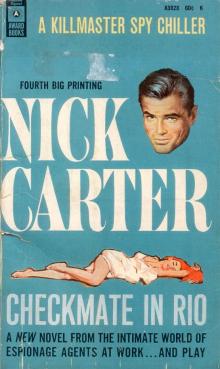 Checkmate in Rio
Checkmate in Rio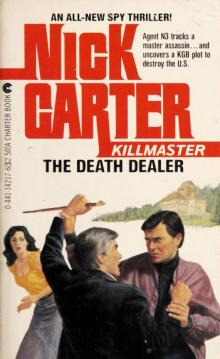 The Death Dealer
The Death Dealer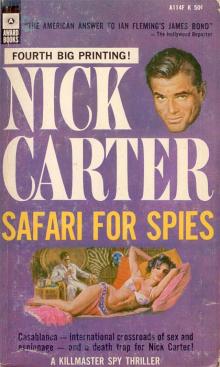 Safari for Spies
Safari for Spies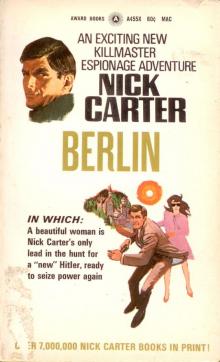 Berlin
Berlin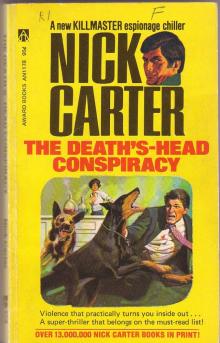 The Death’s Head Conspiracy
The Death’s Head Conspiracy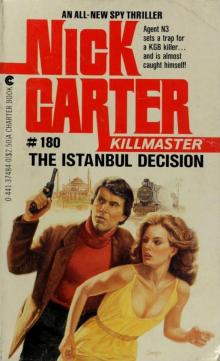 The Istanbul Decision
The Istanbul Decision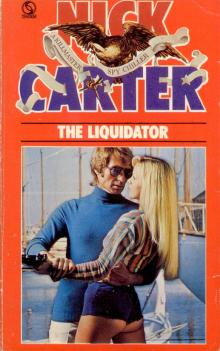 The Liquidator
The Liquidator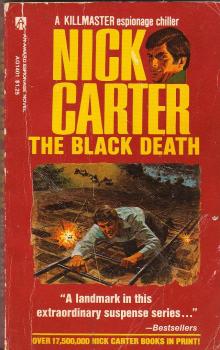 The Black Death
The Black Death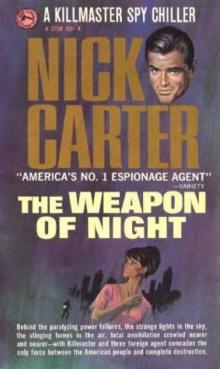 The Weapon of Night
The Weapon of Night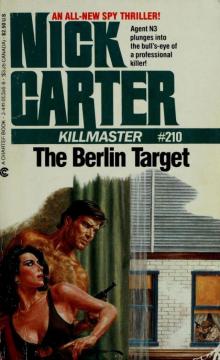 The Berlin Target
The Berlin Target Temple of Fear
Temple of Fear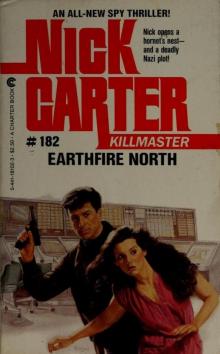 Earthfire North
Earthfire North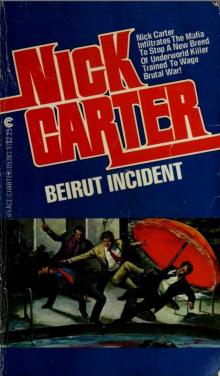 Beirut Incident
Beirut Incident White Death
White Death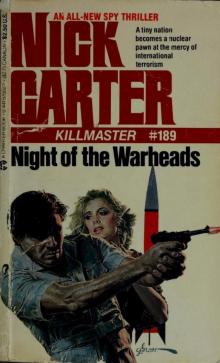 Night of the Warheads
Night of the Warheads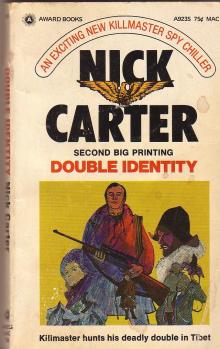 Double Identity
Double Identity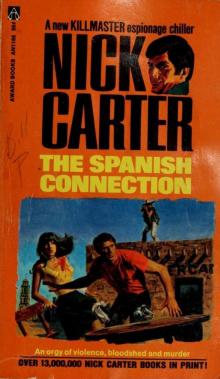 The Spanish Connection
The Spanish Connection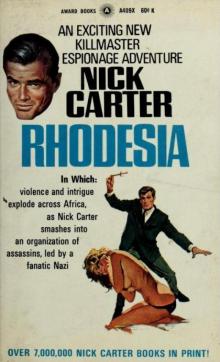 Rhodesia
Rhodesia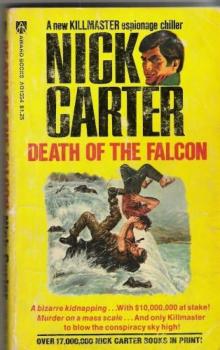 Death of the Falcon
Death of the Falcon The Executioners
The Executioners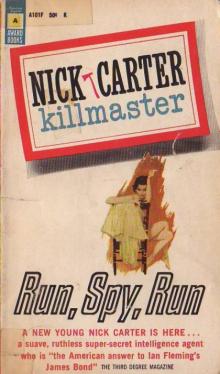 Run, Spy, Run
Run, Spy, Run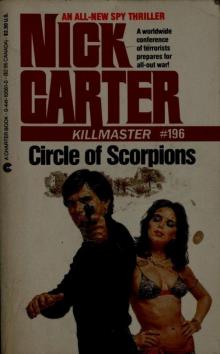 Circle of Scorpions
Circle of Scorpions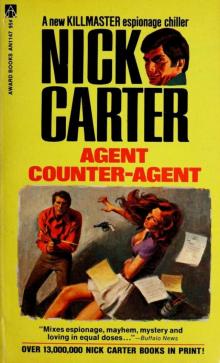 Agent Counter-Agent
Agent Counter-Agent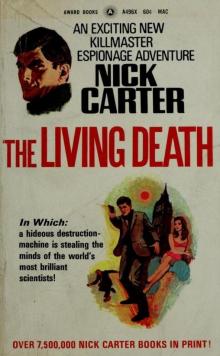 The Living Death
The Living Death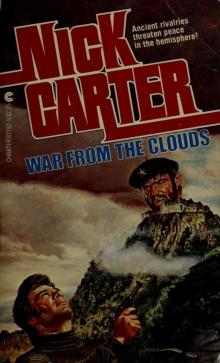 War From The Clouds
War From The Clouds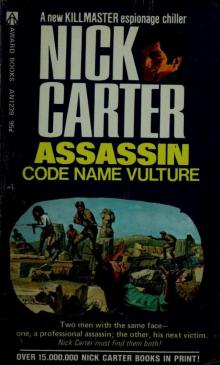 Assassin: Code Name Vulture
Assassin: Code Name Vulture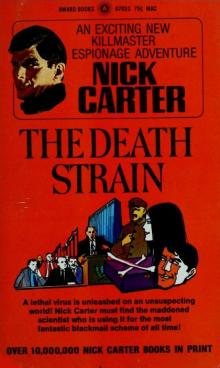 The Death Strain
The Death Strain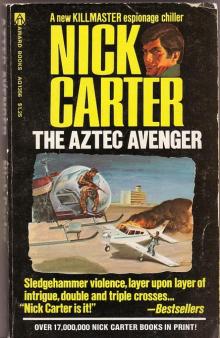 The Aztec Avenger
The Aztec Avenger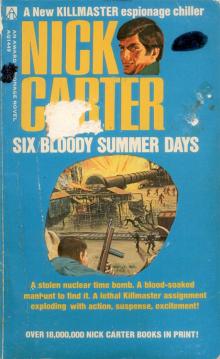 Six Bloody Summer Days
Six Bloody Summer Days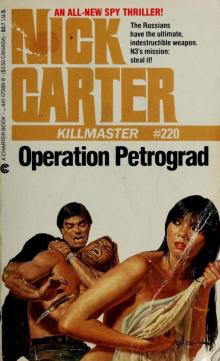 Operation Petrograd
Operation Petrograd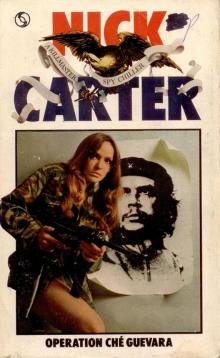 Operation Che Guevara
Operation Che Guevara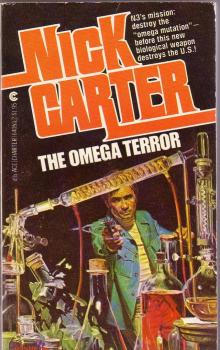 The Omega Terror
The Omega Terror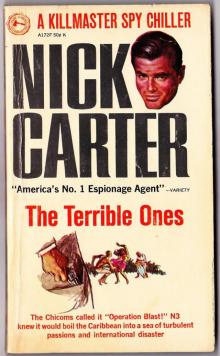 The Terrible Ones
The Terrible Ones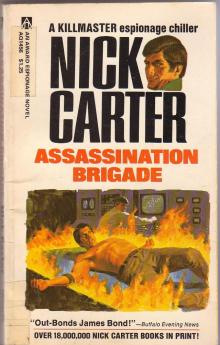 Assassination Brigade
Assassination Brigade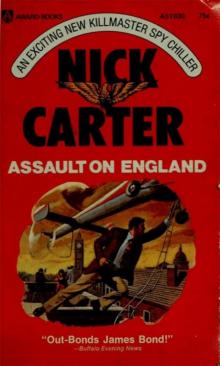 Assault on England
Assault on England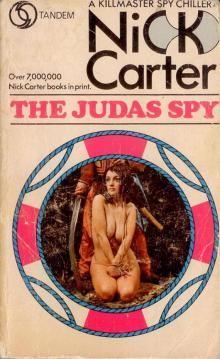 The Judas Spy
The Judas Spy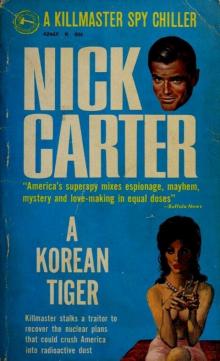 A Korean Tiger
A Korean Tiger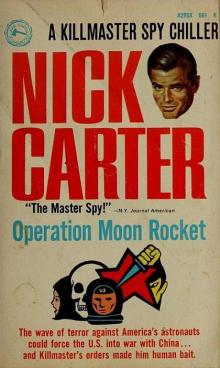 Operation Moon Rocket
Operation Moon Rocket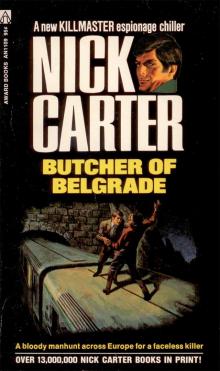 Butcher of Belgrade
Butcher of Belgrade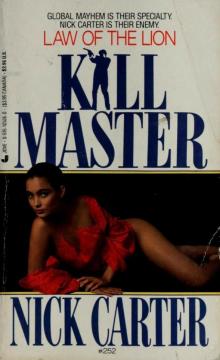 Law of the Lion
Law of the Lion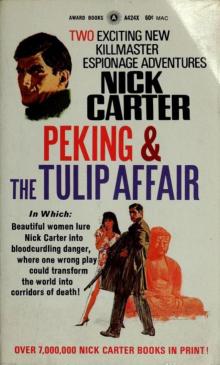 Peking & The Tulip Affair
Peking & The Tulip Affair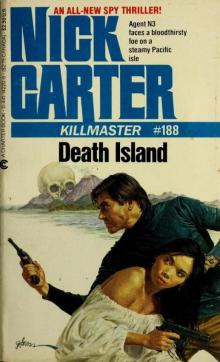 Death Island
Death Island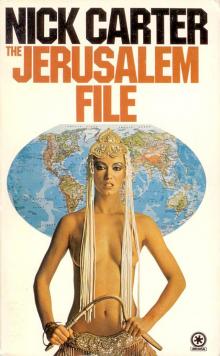 The Jerusalem File
The Jerusalem File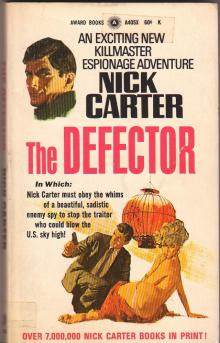 The Defector
The Defector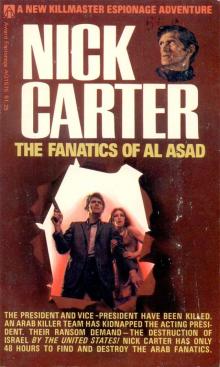 The Fanatics of Al Asad
The Fanatics of Al Asad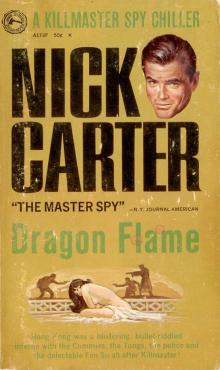 Dragon Flame
Dragon Flame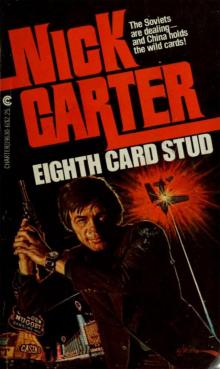 Eighth Card Stud
Eighth Card Stud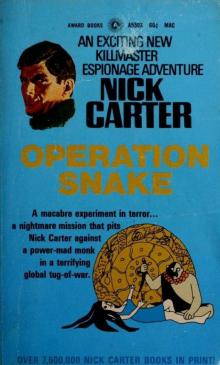 Operation Snake
Operation Snake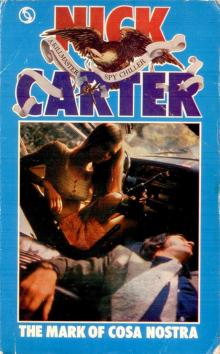 The Mark of Cosa Nostra
The Mark of Cosa Nostra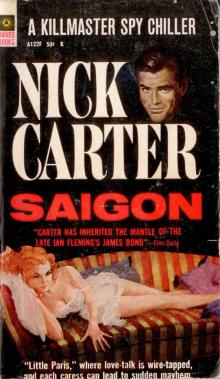 Saigon
Saigon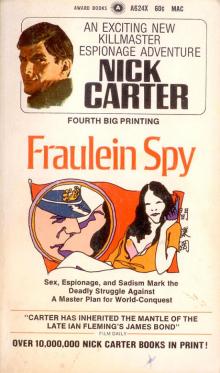 Fraulein Spy
Fraulein Spy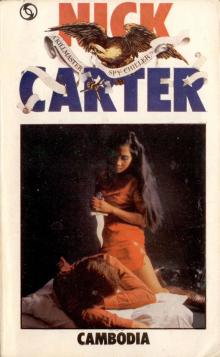 Cambodia
Cambodia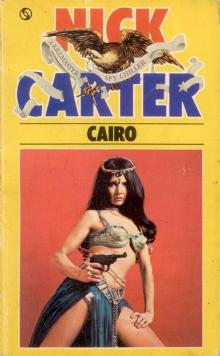 Cairo
Cairo